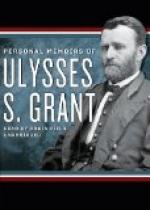the last two with an immense amount of stores, also
fell into our hands. The Tennessee and Cumberland
rivers, from their mouths to the head of navigation,
were secured. But when Confederate armies were
collected which not only attempted to hold a line farther
south, from Memphis to Chattanooga, Knoxville and
on to the Atlantic, but assumed the offensive and
made such a gallant effort to regain what had been
lost, then, indeed, I gave up all idea of saving the
Union except by complete conquest. Up to that
time it had been the policy of our army, certainly
of that portion commanded by me, to protect the property
of the citizens whose territory was invaded, without
regard to their sentiments, whether Union or Secession.
After this, however, I regarded it as humane to both
sides to protect the persons of those found at their
homes, but to consume everything that could be used
to support or supply armies. Protection was
still continued over such supplies as were within
lines held by us and which we expected to continue
to hold; but such supplies within the reach of Confederate
armies I regarded as much contraband as arms or ordnance
stores. Their destruction was accomplished without
bloodshed and tended to the same result as the destruction
of armies. I continued this policy to the close
of the war. Promiscuous pillaging, however, was
discouraged and punished. Instructions were always
given to take provisions and forage under the direction
of commissioned officers who should give receipts to
owners, if at home, and turn the property over to
officers of the quartermaster or commissary departments
to be issued as if furnished from our Northern depots.
But much was destroyed without receipts to owners,
when it could not be brought within our lines and
would otherwise have gone to the support of secession
and rebellion.
This policy I believe exercised a material influence
in hastening the end.
The battle of Shiloh, or Pittsburg landing, has been
perhaps less understood, or, to state the case more
accurately, more persistently misunderstood, than
any other engagement between National and Confederate
troops during the entire rebellion. Correct reports
of the battle have been published, notably by Sherman,
Badeau and, in a speech before a meeting of veterans,
by General Prentiss; but all of these appeared long
subsequent to the close of the rebellion and after
public opinion had been most erroneously formed.
I myself made no report to General Halleck, further
than was contained in a letter, written immediately
after the battle informing him that an engagement
had been fought and announcing the result. A
few days afterwards General Halleck moved his headquarters
to Pittsburg landing and assumed command of the troops
in the field. Although next to him in rank,
and nominally in command of my old district and army,
I was ignored as much as if I had been at the most
distant point of territory within my jurisdiction;
and although I was in command of all the troops engaged
at Shiloh I was not permitted to see one of the reports
of General Buell or his subordinates in that battle,
until they were published by the War Department long
after the event. For this reason I never made
a full official report of this engagement.




